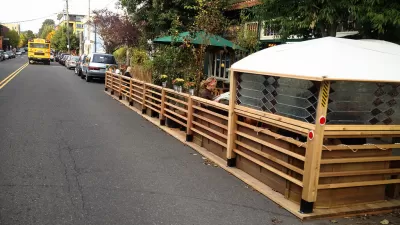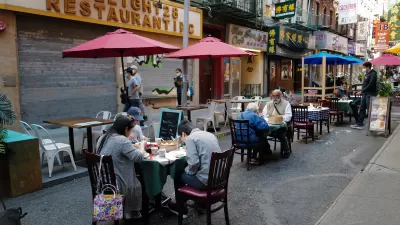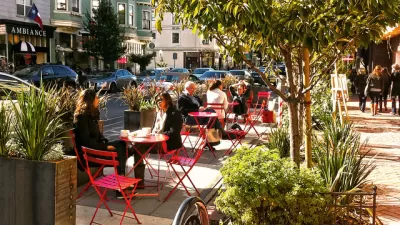Emily Badger of The Washington Post Wonkblog writes about a new study showing the economic benefits of converting street spaces in front of storefronts to parklets. Other options for street spaces include bike lanes, bikeshare docks, and bus lanes.

The piece is similar to the recent CityLab article by Eric Jaffe (posted here) that makes the economic case for converting street parking to bike lanes. Emily Badger's main target, though, is the parklet, a sidewalk extension into the street space that can provide a number of uses. "Most of them included tables, planters and bike racks that created something in between a new public park and an outdoor extension to nearby cafes and sandwich shops," writes Badger.
The study she writes about is the work of the University City District of Philadelphia, "a neighborhood development organization that sent interns out in the spring and summer of 2013 to exhaustively record what happened after a half-dozen of these tiny parks were placed."
The result: a lot more people packed into these spaces than could ever be accommodated by a single car.
Not all of these people were spending money at these nearby businesses (that's a good sign — it means that people recognized they could treat these spaces as public parks and not private outdoor restaurants). But the sales data shared by these businesses suggests that the extra foot traffic — and the outdoor attraction — was a boon for business, even when it came at the expense of a little parking.
The takeaway is that the study provides additional evidence "that a parking spot isn't always the best use of roadside real estate, although we often treat it as such," writes Badger. "And there are some signs that bikeshare docks boost business nearby, too," referencing a study done last year on Capital Bikeshare docking stations and effects on nearby business activity, also posted here.
FULL STORY: Why parking spaces shouldn’t always be wasted on cars

Manufactured Crisis: Losing the Nation’s Largest Source of Unsubsidized Affordable Housing
Manufactured housing communities have long been an affordable housing option for millions of people living in the U.S., but that affordability is disappearing rapidly. How did we get here?

Americans May Be Stuck — But Why?
Americans are moving a lot less than they once did, and that is a problem. While Yoni Applebaum, in his highly-publicized article Stuck, gets the reasons badly wrong, it's still important to ask: why are we moving so much less than before?

Using Old Oil and Gas Wells for Green Energy Storage
Penn State researchers have found that repurposing abandoned oil and gas wells for geothermal-assisted compressed-air energy storage can boost efficiency, reduce environmental risks, and support clean energy and job transitions.

Minneapolis Bans Rent-Setting Software
Four cities have enacted restrictions on algorithmic software that can inflate rent costs.

Oakland to Add 244 New EV Chargers
Oakland plans to launch its new charging network at eight locations by the end of 2025.

Jane Goodall Inspires with Message of Hope, Resilience, and Environmental Action
Speaking in Pasadena, Jane Goodall offered a hopeful and inspirational message, urging global compassion, environmental responsibility, and the power of individual action to shape a better future.
Urban Design for Planners 1: Software Tools
This six-course series explores essential urban design concepts using open source software and equips planners with the tools they need to participate fully in the urban design process.
Planning for Universal Design
Learn the tools for implementing Universal Design in planning regulations.
Heyer Gruel & Associates PA
City of Moreno Valley
Institute for Housing and Urban Development Studies (IHS)
City of Grandview
Harvard GSD Executive Education
Salt Lake City
NYU Wagner Graduate School of Public Service
City of Cambridge, Maryland




























